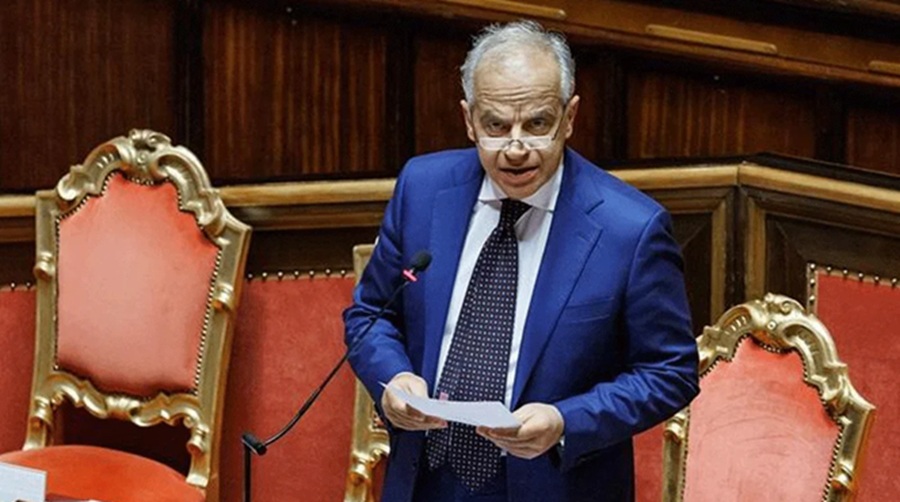Interior Minister Matteo Piantedosi dismissed claims on Wednesday that the government had been blackmailed into releasing Libyan general Osama Almasri last month after his arrest in Turin on an International Criminal Court (ICC) warrant.
Almasri, director of Tripoli’s Mitiga detention centre, is wanted by the ICC for alleged crimes against humanity and war crimes, including murder, torture, rape, and sexual violence committed in Libya from February 2015 onwards. He was flown back to Libya on a secret service flight two days after his 19 January arrest due to a technical issue with his case. The move sparked criticism and led the ICC to request clarification.
Interior Minister denies allegations of blackmail
Piantedosi firmly rejected allegations of undue pressure. “I deny, in the most categorical manner, that, in the hours in which the matter was handled, the government received any act or communication that could be, even remotely, considered a form of undue pressure assimilated to a threat or blackmail by anyone, as has been alleged in some moments of the public debate over the last few days,” he told the Lower House. “On the contrary, as always, every decision taken was purely based on evaluations of facts and situations, with the exclusive perspective of protecting the interests of our country.”
Piantedosi reiterated that Almasri posed a danger to public safety and stressed that he “has never been an interlocutor with the government on matters concerning the management and fight against the complex phenomenon of migration.” The opposition has claimed Almasri played a key role in anti-migrant operations, as Italy has an agreement with Libya to support its coast guard in return for cooperation on migration control.
The minister also addressed accusations that the government had planned Almasri’s repatriation from the outset. “The choice of repatriation methods, in line with what happened in numerous similar cases even in previous years and under different governments, went hand in hand with the assessment carried out for his expulsion,” Piantedosi said. He described the preparation of the repatriation plane as “one of those preventive initiatives, and therefore open to every possible scenario (including transfer to another place of detention), which are the responsibility of those managing security and public order of such importance.”
Nordio puts some blame on ICC
Justice Minister Carlo Nordio provided further details, explaining that the ICC had issued an international arrest warrant for Almasri on 18 January. However, the warrant was only informally communicated to Italian authorities via Interpol the next day, without an accompanying extradition request. “The arrest warrant was delivered on Sunday, 19 January at 9:30 am through an informal communication and the arrest delivered via email by an Interpol official at 12:37, also on Sunday: an absolutely informal communication, without significant data and without the measure in question and the reasons behind it,” Nordio said. He added that he had only been alerted to Almasri’s arrest after it had already taken place in Turin.
Nordio criticised the ICC warrant, calling it “null and void” due to errors in the dates of alleged crimes. “It says starting from March 2016 but the introduction said February 2011, which was when (late Libyan leader Muammar) Gaddafi was still in power,” he pointed out. He also accused the ICC of issuing a “hasty mess” and alleged that some Italian magistrates had been “sloppy” in their handling of the case. “Something like this can be forgiven in politicians but not in those whose job it is to read documentation,” he said.
Criminal Complaints submitted against ministers
Last month, Rome’s chief prosecutor, Francesco Lo Voi, notified Premier Giorgia Meloni, Nordio, Piantedosi, and Cabinet Secretary Alfredo Mantovano that Almasri’s release was under investigation following a complaint by a lawyer. The Tribunal of Ministers is examining the case, while some members of the ruling coalition have suggested it was a retaliatory move against planned judicial reforms.
Nordio also addressed claims that he failed to respond to the appeals tribunal in Rome, which ruled for Almasri’s release due to procedural errors. The judges had notified Nordio’s office on 20 January, but received no reply before deciding to free Almasri. “I think another initiative of mine would have been inadequate and hasty towards the appeals court,” Nordio said, arguing that the ICC itself later amended its documents. “They made a mistake on such a solemn document,” he added. “It is my intention to ask the ICC to justify the discrepancies which I had to report as a duty.”




